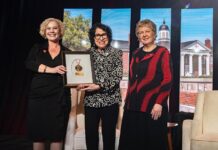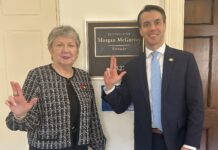Since then, the project has salvaged more than 75,000 pounds of pre-consumer food waste from an unproductive afterlife in a local landfill. The project is operated by volunteer labor under the direction of Brian Barnes, a senior lecturer in UofL’s philosophy department. The project meets Sunday afternoons in a lot adjacent to Belknap Campus. Interested volunteers should call or text Barnes directly at 502-338-1338 for information and directions.
Composting is the process of converting food waste, yard waste, cardboard and similar biological materials into nutrient-dense soil–compost. The compost produced from our efforts is used primarily for the student-run Garden Commons organic garden that literally surrounds the Cultural Center on Belknap Campus. The project’s first year operated on no budget whatsoever. During that time, Barnes transported the trash from Sodexo collection areas to the composting site in his ’96 Jetta. Now, Barnes and his volunteers use a decommissioned university van to collect nearly 1,500 pounds of food waste per week from two Sodexo locations. The project does not collect any meat waste, nor does it collect plastics, metals or other non-compostable materials. Sodexo employees separate the compostable wastes from conventional trash in their food preparation areas, and then they store it for Sunday’s collection in sealed rubber buckets.
On Sundays, the composting volunteers, led by Barnes and humanities major Angie Campbell, load the buckets into the van, drive it back to the composting site, and then dump it into one of 10 reclaimed dumpsters that were once piled at the site. The team layers the mostly vegetable waste, heavy in nitrogen, with a carbon layer of mulch, dry leaves, cardboard or other materials reclaimed from the carbon at the site. This material is generously donated by Aaron Boggs, UofL’s superintendent of grounds. After adding an appropriate amount of water, the team allows the waste to naturally turn into soil, turning it only a few times.
The UofL composting project intends to expand into vermiculture and other sustainable systems. All volunteers are welcome, and no experience is needed. The project is grateful for UofL’s continued support, and it seeks the input of university departments that may be interested in partnerships. Engineers could partner on equipment design, student artists could decorate the van and bins and biologists could use the facility for soil research. Fantastic possibilities are available for independent thinkers and enthusiastic workers. We’ll see you out there!


























